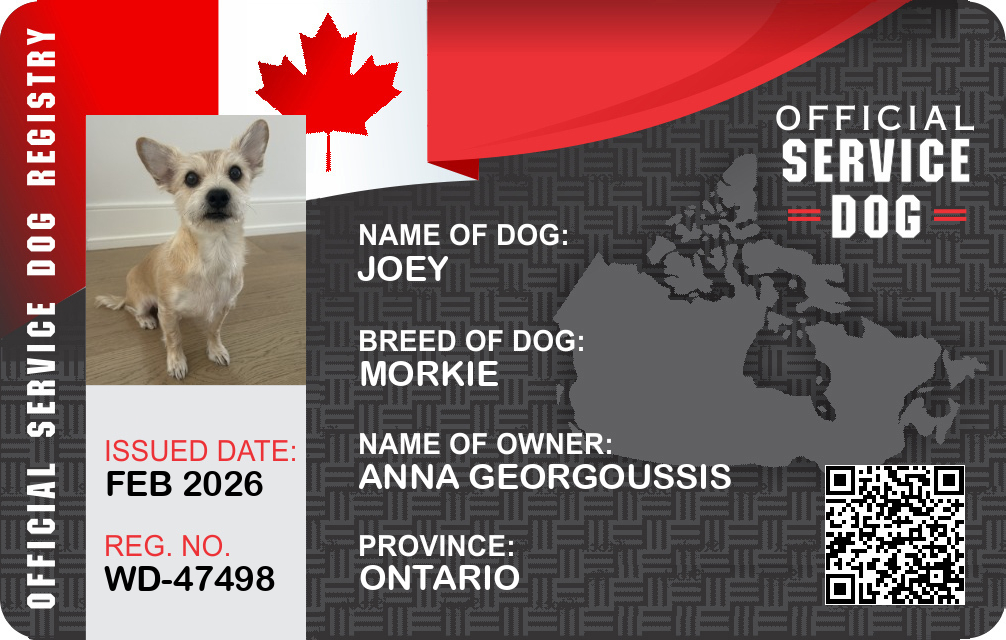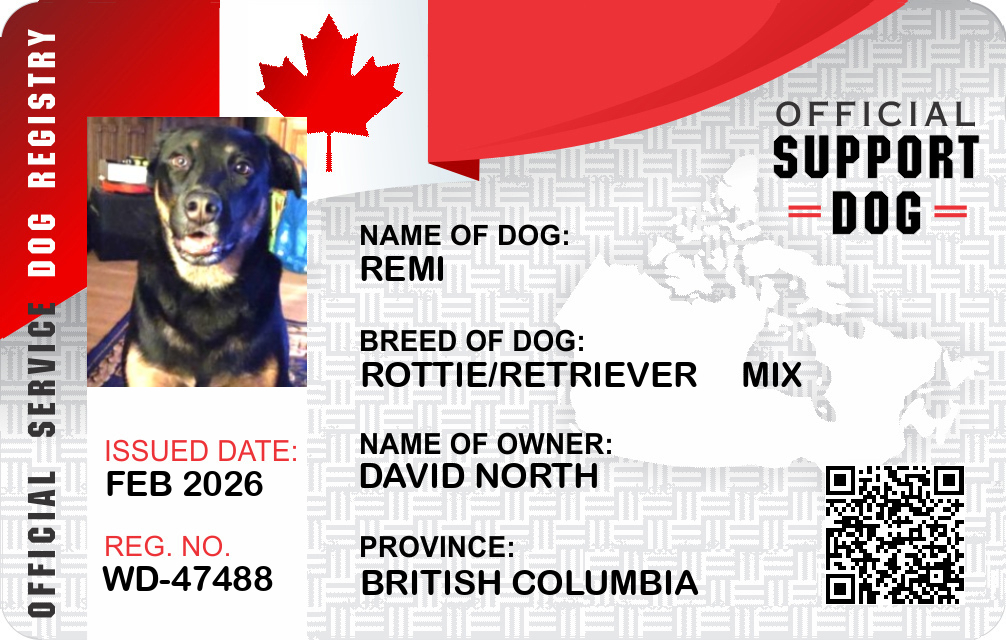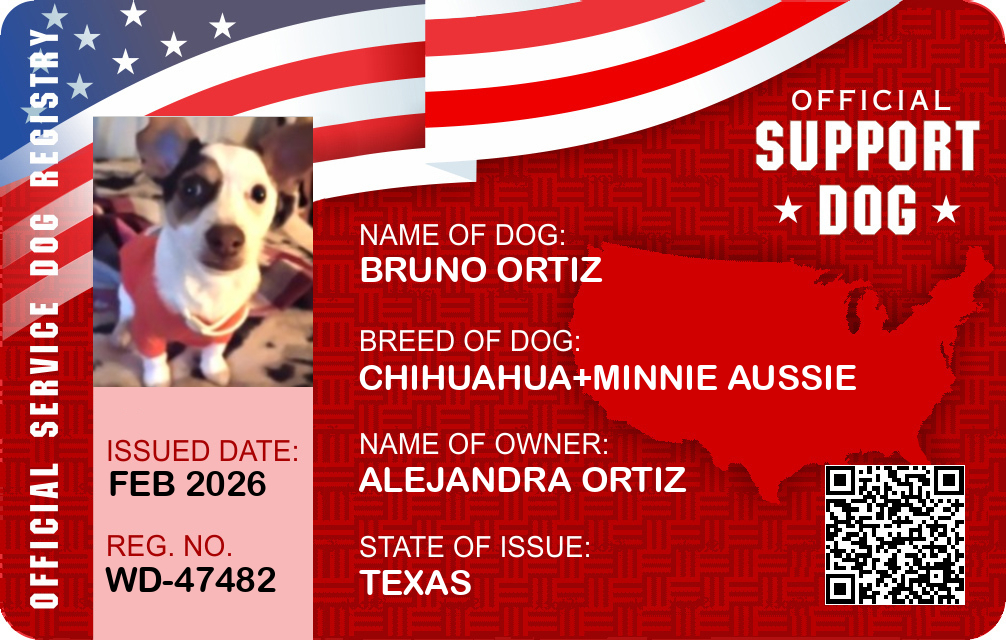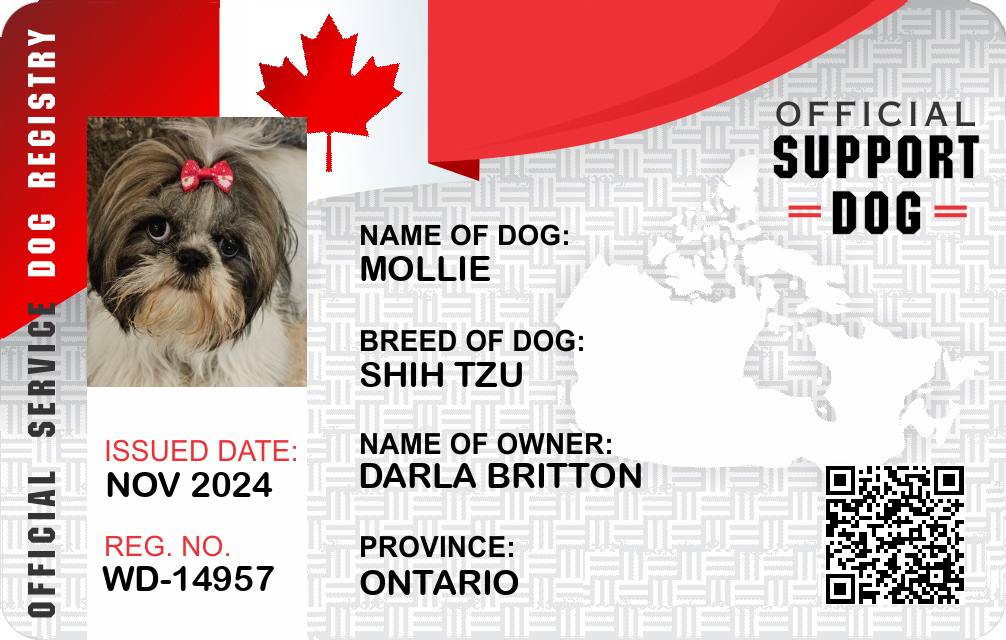Mississippi Service Dog Laws
Get Your Documents
Example State Cards


Overview of Service Dog and Legal Definitions in Mississippi
What is a Service Dog?
A service dog is specifically trained to perform tasks that directly assist a person with a disability. Under the Americans with Disabilities Act (ADA), a service dog must be trained to perform specific tasks that mitigate the handler’s disability. These tasks can range from guiding individuals with visual impairments to alerting deaf individuals, pulling a wheelchair, or even detecting and responding to seizures. The primary criterion is that the dog’s work is directly related to the handler’s disability.
How Service Dogs Differ from Other Types of Assistance Animals
Assistance animals can include service dogs, therapy animals, and emotional support animals (ESA). The critical difference is that service dogs are trained to perform specific tasks for an individual with a disability, whereas therapy animals provide comfort and support in therapeutic settings and ESA offer emotional support but are not trained to perform specific tasks. Service dogs have access rights under the ADA, whereas therapy animals and ESA do not have the same broad access rights.
Key Federal Laws Affecting Service Dogs (e.g., ADA, FHA, ACAA)
Federal laws significantly impact the utilization and rights of service dogs. The ADA ensures that people with disabilities, including those who utilize service dogs, have equal access to public places. This includes parks, restaurants, hospitals, and more. The Fair Housing Act (FHA) prohibits discrimination in housing and requires landlords to accommodate individuals with service dogs, even in no-pet areas. The Air Carrier Access Act (ACAA) governs the rights of service dogs during air travel, ensuring passengers with disabilities can travel with their service dogs without additional charges or restrictions.
State-Specific Service Dog Laws in Mississippi
Mississippi law aligns closely with federal standards regarding service dogs, ensuring individuals with disabilities are protected under the ADA. The state recognizes service dogs as working animals that have been individually trained to perform tasks for their handlers. Mississippi ensures that service dogs and their handlers have rights to access public places, housing accommodations, and transportation, similar to federal law. However, Mississippi does not extend these rights to therapy or emotional support animals unless they meet specific criteria for housing under certain conditions.
Housing Rights and Responsibilities
Under the FHA, individuals in Mississippi with service dogs have the right to live with their animals, even in housing with no-pet policies. Landlords must permit service dogs, but they may require verification if the disability or necessity of the service dog is not apparent. No additional pet deposits can be charged for service dogs, although the handler may be liable for any damages caused by the dog.
Public Access and Accommodation
Public accommodations in Mississippi must permit service dogs accompanying individuals with disabilities. This includes restaurants, hotels, educational institutions, and more. The individual may not be subjected to inquiries beyond asking if the dog is a service animal required because of a disability and what tasks the dog performs. Facilities cannot demand documentation or certification of the customer’s service dog.
Transportation and Travel Rules
Mississippi adheres to the ACAA regarding service dogs on transportation. Airlines must allow service dogs to accompany their handlers in the cabin. Handlers must notify airlines 48 hours in advance, and the dog must be trained to behave properly during the flight. Service dogs are not allowed to occupy seats and must remain at the handler’s feet or lap, depending on size.
Employment and Workplace Considerations
Employers in Mississippi must adhere to the ADA, providing reasonable accommodations for employees with service dogs. This includes modifying workplace policies to allow service dogs and potentially altering workspaces to accommodate both the employee and the service dog. Employers cannot demand additional fees or isolating environments for service dog handlers. Requests for documentation about the disability can be made if it is not obvious.
Documentation, Requirements, and Processes in Mississippi
Service Dog Documentation and Who Can Issue It
While the ADA does not require documentation for service dogs, handlers may find it beneficial to have documentation clarifying the need for a service dog, especially concerning housing and employment. This documentation often includes a note from a healthcare provider specifying the individual’s disability and the necessity of a service dog for assistance. Mississippi does not have a formal registry for service dogs, thus official vest, tags, or certification is unnecessary.
Landlord, Business, and Provider Verification Rules
Individuals cannot be required to provide proof of training or certification for their service dogs in Mississippi. However, in housing situations, if the disability or necessity of the service dog is not apparent, landlords can request documentation verifying the need for the animal. Businesses cannot request documentation for service dogs and must limit inquiries to two specific questions outlined under the ADA.
Rights, Limitations, and Legal Risks
Rights Service Dog Handlers Have in Mississippi
In Mississippi, service dog handlers have the right to access public places, reside in housing with their service animal regardless of pet policies, and reasonable accommodation in their workplace. They cannot be charged extra fees for having a service animal, nor can they be subjected to discrimination based on needing a service animal for their disability.
Limits on Service Dog Protections and Common Restrictions
Service dogs can be excluded if their behavior poses a direct threat to the health or safety of others or if they are out of control and the handler does not take effective action to control it. Areas such as sterile environments within medical facilities may be restricted if the animal’s presence would jeopardize a sterile area.
Penalties for Fraud or Misrepresentation
Mississippi imposes penalties on the misrepresentation of a pet as a service animal. Individuals caught falsely claiming an untrained pet as a service dog may face fines and legal action. Educating the public about the importance of legitimate service animals is crucial in preventing fraud.
Practical Guidance for Service Dog Handlers in Mississippi
How to Qualify for a Service Dog Legitimately
To qualify for a service dog in Mississippi, individuals should have a documented disability that significantly impacts their daily life and can be mitigated by a specially trained service dog. Partnering with a reputable organization or trainer can ensure the dog meets all the necessary training requirements to function effectively as a service dog.
How to Talk to Landlords, Airlines, and Employers
When discussing service dog accommodations with landlords, emphasize that the dog is a trained service animal necessary for your disability. Offer documentation if the need is not obvious. For airlines, adhere to the ACAA requirements and notify them 48 hours ahead of travel. At the workplace, involve HR early and communicate the specific tasks your service dog performs, addressing any concerns about workplace impact.
Summary of Service Dog Laws in Mississippi
**
- Service Dog Definition: Individually trained to assist with tasks related to a disability.
- Legal Protections: Governed by ADA, FHA, ACAA, and applicable state laws.
- Public Access: Guaranteed except if threatening health/safety or in sterile areas.
- Housing and Employment: Must be accommodated without extra fees, with reasonable requests for documentation.
- Transportation: Allowed under airline-specific guidelines, must notify 48 hours in advance.
- Documentation: Not federally required; healthcare documentation may assist in housing or employment.
- Risks of Misrepresentation: Penalties in place for falsely claiming service animal status.
- Handling Interactions: Educate landlords and employers regarding rights, adhere to protocol with airlines.
**
By understanding and adhering to both federal and state-specific laws in Mississippi, service dog handlers can ensure they and their service animals are afforded the rights they are entitled to while maintaining positive, compliant interactions in public spaces, housing, travel, and employment.
Get Your Documents
Example State Cards













